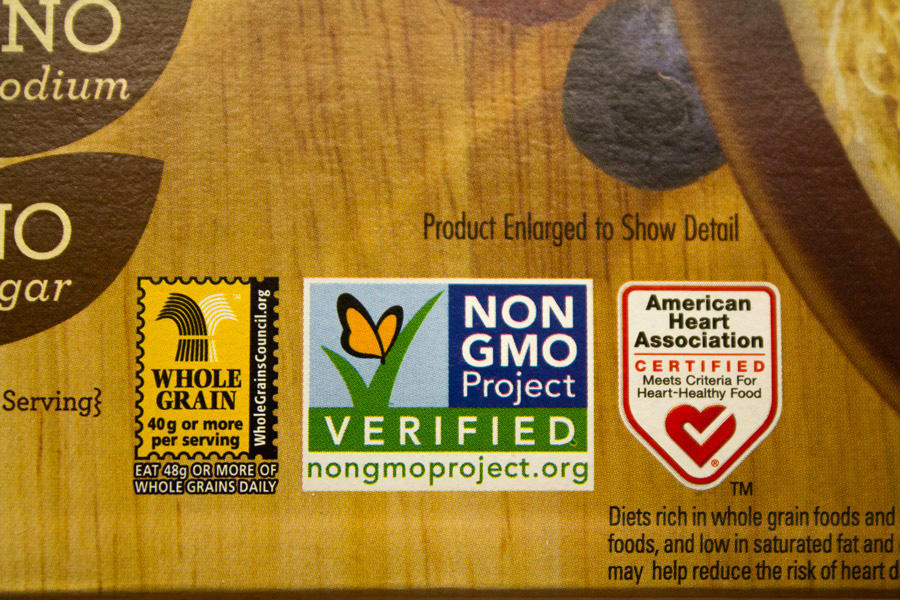This is a simple explanation on a subject that is often misunderstood. To be or not-to-be as a GMO crop.
The writer points out here that VT recently passed laws to require proper labeling of food. You know that because we've covered their legislation extensively through our main site and radio. It should be a good first experience--in a small state--on the ramifications of labeling laws.
This issue is a game-changer in the food business. It impacts every part of the food chain...from producers to retailers. Are consumers being mislead? Is it true both types of food are healthy, and modifications simply make the crops more resilient and productive? Tough questions to answer and, as you know, it brings up larger issues pitting industrial production against local supplies.
As consumers, at the end of the day, our best hope is true, transparent information that accords us a true chance to make a good buying decision.
What Are GMO Labels?
By Jeremy Bernfeld
Demand is growing for GMO-free labels on food
products, according to the Non-GMO Project, one of the principle
suppliers of the label.
There’s a heated debate happening right now about GMOs and labels.
Big food companies like General Mills, Mars and Kellogg’s say they plan to put labels on their products that tell consumers whether or not the food contains ingredients derived from genetically engineered plants.
So what’s the big deal? What are GMO labels, and what do they tell you?
Watch the video below to get the full scoop on GMO labels.
Here are three things you should know:
1. Think processed food
GMO stands for genetically modified organisms. GMO labels would be slapped on food that contains ingredients made from plants that were genetically engineered.
Many processed foods contain corn syrup, soybean, canola or cottonseed oil. Most of those crops grown in the U.S. are genetically engineered. Scientists can insert a gene into a variety of corn, for instance, to make it immune to a weedkiller, so when farmers spray their fields the weeds die but the corn doesn’t.
2. Don’t think safety or nutrition
Some food and consumer groups say products made from GMO crops should have special labels for the sake of transparency.
Food regulators here in the U.S. don’t require them, though, and the U.S. Food and Drug Administration says genetically engineered ingredients are just as nutritious and safe to eat as ingredients from other crops. GMO labels won’t verify safety or nutrition.
Other advocates object to the cultivation of the current slate of engineered crops for environmental, economic and political concerns.
3. Think Vermont
Vermont passed a law requiring GMO labels on food sold in the state. And there’s a deadline: the labels must be in effect by July 1.
In response, some companies are going ahead with the labels, saying they can’t afford different labels for different states. Other companies are fighting the law – they worry the labels will look like a warning and scare consumers.
Of course, if you want to go GMO-free you can buy food labeled by the Non-GMO Project, a nonprofit organization, or you can buy organic. Food that sports a USDA organic seal is not allowed to contain ingredients derived from genetically engineered plants.
Big food companies like General Mills, Mars and Kellogg’s say they plan to put labels on their products that tell consumers whether or not the food contains ingredients derived from genetically engineered plants.
So what’s the big deal? What are GMO labels, and what do they tell you?
Watch the video below to get the full scoop on GMO labels.
Here are three things you should know:
1. Think processed food
GMO stands for genetically modified organisms. GMO labels would be slapped on food that contains ingredients made from plants that were genetically engineered.
Many processed foods contain corn syrup, soybean, canola or cottonseed oil. Most of those crops grown in the U.S. are genetically engineered. Scientists can insert a gene into a variety of corn, for instance, to make it immune to a weedkiller, so when farmers spray their fields the weeds die but the corn doesn’t.
2. Don’t think safety or nutrition
Some food and consumer groups say products made from GMO crops should have special labels for the sake of transparency.
Food regulators here in the U.S. don’t require them, though, and the U.S. Food and Drug Administration says genetically engineered ingredients are just as nutritious and safe to eat as ingredients from other crops. GMO labels won’t verify safety or nutrition.
Other advocates object to the cultivation of the current slate of engineered crops for environmental, economic and political concerns.
3. Think Vermont
Vermont passed a law requiring GMO labels on food sold in the state. And there’s a deadline: the labels must be in effect by July 1.
In response, some companies are going ahead with the labels, saying they can’t afford different labels for different states. Other companies are fighting the law – they worry the labels will look like a warning and scare consumers.
Of course, if you want to go GMO-free you can buy food labeled by the Non-GMO Project, a nonprofit organization, or you can buy organic. Food that sports a USDA organic seal is not allowed to contain ingredients derived from genetically engineered plants.

No comments:
Post a Comment